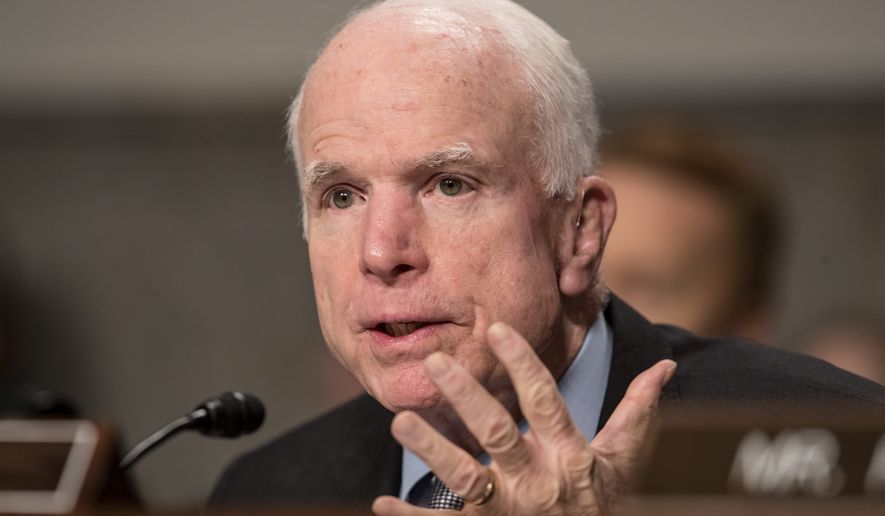The maverick is back.
Sen. John McCain once again is basking in the media spotlight as the go-to Republican on Capitol Hill for voicing opposition to the Republican in the White House. This time, he’s bucking President Trump and doing it with newfound vim.
In Mr. Trump’s first two weeks in office, Mr. McCain broke with him over the decision to scrap the Trans-Pacific Partnership trade deal, said his proposed import tax on U.S. businesses relocated to Mexico was “insane” and took the lead in raising alarm about the reorganization of the National Security Council.
He also found a reason to blast Rep. Mick Mulvaney, Mr. Trump’s nominee for the key post running the Office of Management and Budget. He said the longtime deficit hawk had spent his career pushing cuts to defense spending.
“All I can say to you, sir, is that I’m deeply concerned about your lack of support for our military,” he fumed at Mr. Mulvaney’s confirmation hearing.
It’s a familiar role for the Arizona Republican, who has been making headlines and earning appearances on TV news by criticizing his party’s leaders since Ronald Reagan was in the White House.
The frequent attacks against Mr. Trump also have made Mr. McCain the target of all-to-familiar recriminations from the right.
“John McCain’s juvenile obstructionism to President Trump and the Republican Party’s pro-America agenda clearly reflects his disdain for the will of the majority of everyday Arizonans,” said Jake Hoffman, a former spokesman for the Maricopa County Republican Party, which opposed Mr. McCain’s re-election bid last year because of what it said were his liberal leanings.
Mr. Hoffman, a member of the town council in Queen Creek, Arizona, and vice president of the local Republican Party, said Mr. McCain continued “to parrot the hyperbolic talking points of congressional Democrats in a desperate attempt to maintain their grasp on the Washington, D.C., status quo — representing the precise reason that the American people elected to drain the swamp last November.”
Mr. McCain insisted that the news media created McCain versus Trump narrative.
“It’s totally false, and I know that it is really easy for the media to say that,” Mr. McCain told The Washington Times, noting that as chairman of the Senate Armed Services Committee he expedited approval of the nomination of James N. Mattis for defense secretary.
Mr. McCain said he was also 100 percent on board with Mr. Trump’s plans to rebuild the U.S. military, including putting out a white paper in support of the plan.
But he vowed never to hold his tongue when he disagreed with a president — any president.
“I’m the one who said Ronald Reagan shouldn’t send troops to Beirut. I’m the one that said George W. Bush ought to fire the secretary of defense. I’m the one that said the chairman of the Joint Chiefs of Staff ought to be fired. I’m always the same,” said Mr. McCain. “I know how convenient it is for the media to set me up versus Trump. I’m representing the people of Arizona and decades of military experience and knowledge on national security.
“When George W. Bush said he looked into [Russian President] Vladimir Putin’s eyes and saw his soul, I said, ’I’ve looked into his eyes and I saw the KGB,’” he said. “That is a clear record of doing what’s right and relying on my knowledge and background and instincts. But it is very convenient for [the news media] to say, ’It’s McCain versus Trump.’ But it’s not. It’s McCain doing his duty.”
Indeed, Mr. McCain was a fierce critic of President Obama’s handling of Mr. Putin, the Iraq War pullout, the rise of the Islamic State terrorist group and the scandal at Veterans Affairs hospitals — to name a few. But the press was generally less interested in Mr. McCain, the 2008 Republican presidential nominee, attacking a Democratic rival.
Still, Mr. McCain has had a strained relationship with Mr. Trump since early in last year’s presidential campaign.
When Mr. McCain said Mr. Trump’s run was “firing up the crazies,” Mr. Trump responded by discounting the former Navy fighter pilot’s status as a Vietnam War hero who was shot down, captured, tortured and refused release by his captors after they learned his father was a U.S. Navy admiral.
“I like people who weren’t captured,” Mr. Trump famously quipped.
Since then, it’s been mostly downhill.
Mr. McCain skipped the Republican National Convention in Cleveland. In October, he withdrew his endorsement of his party’s nominee after an 11-year-old video surfaced in which Mr. Trump used crude language about women.
After Mr. Trump’s upset victory in November, Mr. McCain became a frequent detractor.
The senator took credit for giving FBI Director James B. Comey a dossier that contained incriminating allegations about Mr. Trump that was purportedly compiled by Russian intelligence agents. The authenticity of the dossier was eventually debunked.
Mr. McCain also joined Democrats in calling for an investigation of an alleged connection between Mr. Trump and Russia related to email hacks during the presidential race.
Sen. Lindsey Graham, a South Carolina Republican who reliably joins Mr. McCain in opposing the president, also blamed the news media for creating the impression of a grudge fight.
“The mainstream media is in a panic. They’re looking for any reason, any lifeline out there, and the truth is in politics it’s the two times out of 10 that you disagree that gets all the coverage,” he said. “The bottom line is, I think, the people in the administration know Sen. McCain very well and there will be no better ally in rebuilding the military. For most of the big stuff that President Trump wants to do, he will be invaluable. He can move the needle more than most people in our caucus.”
• S.A. Miller can be reached at smiller@washingtontimes.com.




Please read our comment policy before commenting.